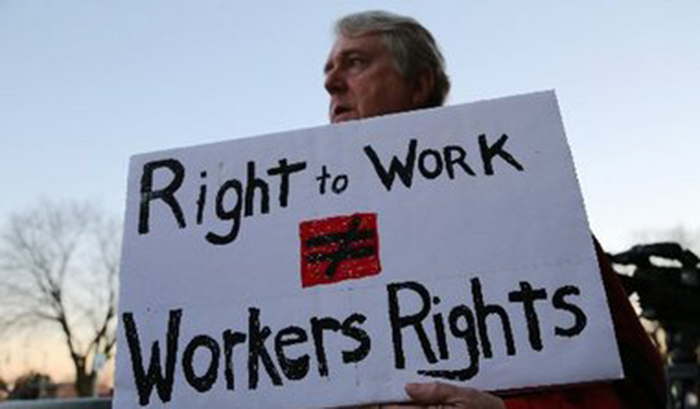The United Federation of Teachers in New York City is the largest teacher union local in the nation. At its delegate assembly last week, union reps from all over the city endorsed Mayor Bill de Blasio for re-election, and that’s what grabbed the headlines.
But according to several attendees, something remarkable was said by UFT president Michael Mulgrew – and in such an off-handed way it provoked resentment.
The exact verbiage used by Mr. Mulgrew differed from source to source, so here are” the accounts of two who attended. First, Arthur Goldstein of the NYC Educator blog:
Unless there is a big shift…things can change…we will all be right to work sooner or later. Will it leave states to decide when 1975 decision is overturned? We have legal people and strategists thinking about it. 27 RTW states. NY and CA, MA union strongholds. Believes it will happen, and we have to organize. At AFT exec. committee, we help RTW states organize. Says elections matter.”
Mr. Goldstein remarked in a later post:
“It was also interesting to hear Mulgrew casually admit that we were on the precipice of becoming a ‘Right to Work’ country. I haven’t got the remotest notion of what we do when that happens.
Mike Schirtzer of the union’s MORE caucus was more direct:
“Mulgrew replied, ‘We are going to become a right-to-work country. We are preparing for what we will do when that happens on the state and city levels. It depends on the provision in the laws and what states can do within that law- some states sign up members every year others sign once.”
Basically, he has already thrown in the towel! Mr. Mulgrew spent at least 30 minutes explaining how his tweet campaign is the greatest thing and when members want to know how is the union planning to really fight back against the greatest threat, the president of the largest AFT local basically said we have already lost.
“Would right-to-work be utter devastation to teacher unions, or something they could handle? The answer lies somewhere in-between. Florida, for example, is a right-to-work state, but it still practices exclusive bargaining. So while membership in the Florida Education Assn. hovers around 50 percent of potential, with no way to compel payments from non-members, it still carries on much as a union would in New York or California.
Such a situation is bad for a union, but hardly life-threatening. FEA is the sixth-largest state affiliate in the National Education Assn.
On the other hand, there is a very big difference between forming a teacher union from nothing in a right-to-work state, and going to right-to-work after being in an agency fee state since the 1977 Abood decision.
Mr. Mulgrew and other union officers in the same boat are kidding themselves if they think they will easily navigate the transition by means of improved organizing. They will have to downsize, and since union employees are unionized that means difficult negotiations. It also means cost-cutting in other areas, including Mr. Mulgrew’s $283,000 annual salary.
If teacher unions look at a diminished future as an opportunity to examine their own internal structures, they could emerge as leaner, but meaner organizations. If they think the problem will be solved with Twitterstorms, rallies and litigation, they will only further isolate themselves from the rank-and-file.
Mr. Antonucci may be contacted at mike@eiaonline.com

